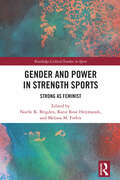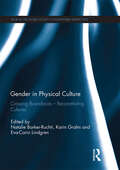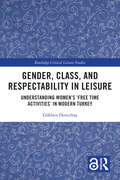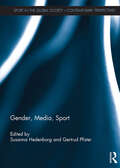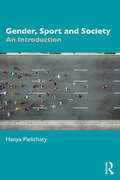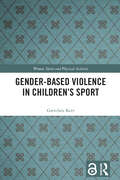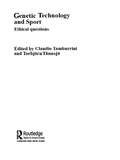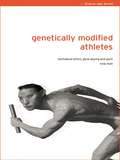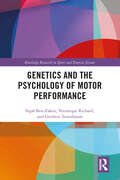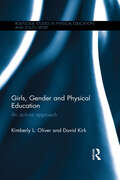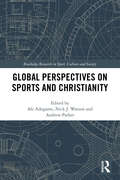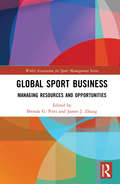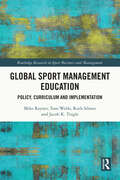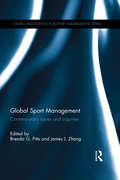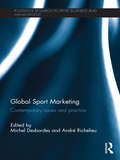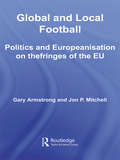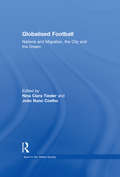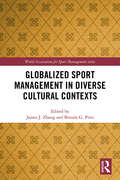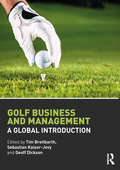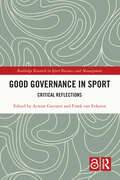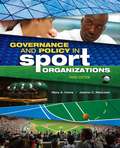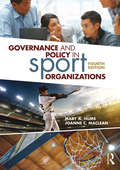- Table View
- List View
Gender and Power in Strength Sports: Strong As Feminist (Routledge Critical Studies in Sport)
by Katie Rose Hejtmanek Noelle K. Brigden Melissa M. ForbisThis book explores strength sports as a site of political contestation and a platform for insurgent gender practices. It contributes to our understanding of key themes in the study of sport, such as feminism, power, the body and identity. Drawing together interdisciplinary work spanning political science, sociology, gender studies, and biological and cultural anthropology, the book argues that in the face of ongoing embodied precarity, strength sports have become a complex form of both resistance to, and reproduction of, patriarchy. This argument also challenges traditional understandings and definitions of “strength.” Covering recreational-level participation and elite athletics, across experiential/individual, local, national, transnational, and global scales, the book explores diverse topics such as the pregnant strength athlete, the status of trans women in strength sports, and the gendered dimensions of online fitness communities during the COVID-19 pandemic. In so doing, it traces power dynamics and the interplay among multiple oppressions. Showcasing important empirical and activist research, this book is fascinating reading for anybody with an interest in women’s sport, women’s studies, gender studies, the sociology of sport, strength and conditioning, feminist politics, or cultural studies.
Gender in Physical Culture: Crossing Boundaries - Reconstituting Cultures (Sport in the Global Society – Contemporary Perspectives)
by Karin Grahn Natalie Barker–Ruchti Eva–Carin LindgrenThis volume outlines existing research relating to gender in physical culture. The introductory chapter employs Lamont and Molnàr’s (2002) idea of ‘boundaries’ as visible and invisible socially constructed borders that create social differences, as the theoretical framework for the book. Seven empirically-driven case studies follow which, on the one hand, demonstrate how boundary ‘work’ has taken and is taking place at the level of media, institutions, communities and individuals; and on the other hand, show how individuals, groups of individuals and organisations challenge and change dominant gender discourses and practices. The wide variety of rich case materials reveal how gender ideals not only normalize, but are actively and purposefully negotiated and transformed to create individualised and inclusive physical culture contexts. The final chapter explores how the book builds on and extends existing gender and physical culture research.This book was originally published as a special issue of the journal Sport in Society.
Gender, Class, and Respectability in Leisure: Understanding Women’s ‘Free Time Activities’ in Modern Turkey (Routledge Critical Leisure Studies)
by Gökben DemirbaşThis book interrogates the role of gender and class in shaping women’s everyday leisure practices. Drawing on empirical research in urban Turkey, the book explores how leisure is perceived and practised by women within their communities.The book examines the relationship of women’s leisure to their labour, women’s access to and uses of public leisure spaces, and the dynamics of their everyday sociability within their neighbourhoods. It is the first book to apply Skegg’s concept of ‘respectability’ – socially recognised judgments and standards which label the ‘right’ practices, that hold morality and power in a given context – as a theoretical tool with which to understand leisure in a country in which modernisation and Westernisation have been a central dynamic shaping political, social, and cultural life. This analysis reveals that two measures of gendered respectability – reproductive work and the honour code – and how they mediate with the classed measures of respectability, are essential to understanding women’s leisure practices in the Turkish context. The book argues that these interactions are likely shared in many Global South countries, including Islamic societies. Therefore, this analysis shines important new light on women’s experiences more broadly, and on the social, political, and cultural dynamics of traditional social structures in a modernising world.This book is fascinating reading for anybody with an interest in leisure studies, women’s studies, sociology, cultural studies, or Middle East studies.
Gender, Media, Sport (Sport in the Global Society – Contemporary Perspectives)
by Susanna Hedenborg and Gertrud PfisterDespite the position that sport occupies at the centre of public attention, and despite the billions of consumers and immense coverage which it attracts from around the globe, it seems that the media prioritise coverage of only a very small fraction of sporting events, and a few prominent athletes. It goes without saying that sport in the media is dominated by men – they are a large majority among athletes, consumers, journalists, and producers. This book will shed new light on the long discussed question of gendered sporting coverage, in an era when the Olympics can be dubbed the ‘women’s games’. Some of the contributions present new perspectives such as: the relationship between media and sport in Poland; media presentations of men and women in gender ‘adequate’ and ‘inadequate’ sports; competition between women and men participating in the same events; the presentation of celebrities; and the framing of doping within the context of gender relations. Furthermore, the book focuses not only on athletes, sports and events, but also on consumers, such as hooligans and their brand of masculinity, and on journalists, such as Mike Penner, who attempted to transgress gender boundaries. This book was originally published as a special issue of Sport in Society.
Gender, Sport and Society: An Introduction
by Hanya PielichatyIntroducing the core concepts, issues and debates in the study of gender and sport, this is an accessible, engaging and thought-provoking textbook for anyone studying or interested in sport. It highlights the complexity of the gendered sporting world. Exploring inequalities in society that are reflected in sporting spaces and practices, and offering practical guidance on how to develop study skills and critical thinking, this textbook empowers readers to view the world in a different way. The book explores the social and political aspects of gender, sport and society, as well as their intersection with race/ethnicity, dis/ability, and sexualities. Introducing the basics of gender theory as applied to sport, and placing equity, diversity and inclusion at the heart of the discussion, the book explores key themes, current issues and hot topics, such as women in esports, mental health, and parenthood. The book also looks at how gender and gender stereotypes play out in the world of sport business and management. The reader is asked to co-create the textbook’s narrative by engaging with several pedagogical features, such as ‘stop and think’ and seminar activities, requesting the reader to be an active and critical participant. The compact and considered chapters will help to break down the complexity involved in this subject area. The final chapter is dedicated to study skills and practical learning advice, acting as a study guide to complement the discipline-rich chapters that come before it. This textbook is written from practitioner-educator experience ensuring the content is degree-specific, critically positioned, and most importantly, inclusive and accessible. Full of useful features in every chapter, from subject ‘insights’ to guides on further reading, media links and other sources, as well as example assignment questions, this is an indispensable textbook for all students of gender and sport, women and sport, the sporting body, sport and society, social issues in sport, inclusion in sport, and sport development, and fascinating reading for anyone with an interest in sport, gender studies or sociology more broadly.
Gender-Based Violence in Children’s Sport (Women, Sport and Physical Activity)
by Gretchen KerrThis book addresses the major forms of Gender-Based Violence (GBV) in children’s sport, including sexual, physical, and psychological violence and neglect. It reviews the historical, sociocultural, and political influences on violence towards children, and sets out future agendas for research and practice to eliminate GBV in sport. The book argues that for GBV to occur and be sustained over time, it must be facilitated by a system that enables this violence, protects the perpetrator, disables bystanders, silences the victims, and/or fails to provide a structure by which to address victims’ or bystanders’ concerns. Drawing on empirical research from across a range of disciplines, including sport sociology, sport psychology, developmental psychology, and coaching, and examining real life case studies of GBV in sport at all levels, the book makes a powerful case for radical change in our current systems of sport governance, safeguarding, and athlete welfare. This is important reading for any student, researcher, policy-maker, coach, welfare officer or counsellor with an interest in sport, gender studies, safeguarding, criminology, or sociology. An electronic version of this book is freely available, thanks to the support of libraries working with Knowledge Unlatched (KU). KU is a collaborative initiative designed to make high quality books Open Access for the public good. The Open Access ISBN for this book is 9781003035138. More information about the initiative and links to the Open Access version can be found at www.knowledgeunlatched.org.
Genetic Technology and Sport: Ethical Questions (Ethics and Sport)
by Torbjörn Tännsjö Claudio TamburriniWill the genetic design of athletes destroy sport … or will it lead to a new and extraordinary age of athletic achievement? Exploring a new territory in sport and ethics, this edited collection contains some of the best new writing that has emerged from the debates concerning the uses of genetic technologies to improve sport performance. Issues covered include: * gene technology and sports ethics* genetic testing in sports* gene technology and the sporting ethos* gene technology and gender equality in sport. This cutting-edge text is the first on the subject to analyze gender specific questions that arise from genetically modified sport and is likely to provoke further debate in the world of sport and bio-ethics. Contributors include Lincoln Allison, Ruth Chadwick, Arne Ljungqvist, Andy Miah, Christian Munthe, Bengt Saltin, Angela Schnieder and many more.
Genetically Modified Athletes: Biomedical Ethics, Gene Doping and Sport (Ethics and Sport)
by Andy MiahIn a provocative analysis of sport ethics and human values, Genetically Modified Athletes imagines the brave new world of sport. The internationally acclaimed book examines this issue at a crucial time in its theorisation, questioning the very cornerstone of sporting and medical ethics, asking whether sporting authorities can, or even should, protect sport from genetic modification. This book brings together sport studies and bioethics to challenge our understanding of the values that define sport. We already allow that athletes can optimise their performance by the use of technologies; without wishing to assert that 'anything goes' in sports performance enhancement, Andy Miah argues that simply being human matters in sport and that genetic modification does not have to challenge this capacity. Genetically Modifies Athletes includes examination of: * the concept of 'good sport' and the definition of cheating* the doped athlete - should we be more sympathetic?* the role of the medical industry* the usefulness (or not) of the terms 'doping' and 'anti-doping'. An important and growing field of interest, this book should be read by students, academics and practitioners.
Genetics and the Psychology of Motor Performance (Routledge Research in Sport and Exercise Science)
by Gershon Tenenbaum Sigal Ben-Zaken Véronique RichardDespite the prevalence of behavioral research conducted through genetic studies, there is an absence of literature pertaining to the genetics of motor behavior. Genetics and the Psychology of Motor Performance is the first book to integrate cutting-edge genetic research into the study of the psychological aspects of motor learning and control.The book’s central line of enquiry revolves around the extent to which psychological factors central to motor proficiency – including personality, emotion, self-regulation, motivation, and perceptual-cognitive skills – are acquired or inherited. It explains how these factors affect motor performance, distilling the latest research into their genetic underpinnings and, in doing so, assessing the magnitude of the role genetics plays in the stages of motor development, from early proficiency through to expertise.Written by leading experts in the genetics of human performance and exercise psychology, and thoroughly illustrated throughout, Genetics and the Psychology of Motor Performance is a crucial resource for any upper-level student or researcher seeking a deeper understanding of motor learning. It is an important book for anyone studying or working in exercise psychology, motor development, exercise genetics, or exercise physiology more broadly.
German Football: History, Culture, Society
by Christopher Young Alan TomlinsonThis topical book provides unprecedented analysis of football's place in post-war and post-reunification Germany. The expert team of German and British contributors offers wide-ranging perspectives on the significance of football in German sporting and cultural life, showing how it has emerged as a focus for an expression of German national identity and pride in the post-war era. Some of the themes examined include: footballing expressions of local, regional and national identity ethnic dynamics, migrant populations and Europeanization German football’s commercial economy women’s football. Key moments in the history of German football are also explored, such as the victories in 1954, 1972 and 1990, the founding of the Bundesliga, and the winning bid for the 2006 World Cup.
Getter And Getter-Ion Vacuum Pumps
by Georgii L. SaksaganskiiThis unique monograph discusses all aspects of the design and operation of electrophysical ultrahigh-vacuum pumps (EUVP). The adsorption-diffusion model of interaction of gas molecules with metal getters is presented, together with getter films sorption characteristics. A mathematical model of molecular transfer in electrophysical pumps and the principles and criteria of their energy and structural-geometrical optimization are proposed; and the physical processes in the pumps are analyzed during the pumping out of both active and inert gases. Also presented are the generic and specific pump parameters and the methods of calculating their main characteristics. Of special interest are discussions of the design, structure, and operational featuress of evaporation getter and ion-getter pumps with thermal deposition of getter films; EUVP with plasma evaporation; sputter-ion pumps with and without built-in evaporators; pumping out methods based on nonevaporable getters; and impantation, membrane and catalytic pumps. This book will appeal to experts and students in experimental physics, electronics, fusion accelerator techniques and electrophysical and vacuum apparatus design.
Girls, Gender and Physical Education: An Activist Approach (Routledge Studies in Physical Education and Youth Sport)
by David Kirk Kimberly L. OliverIn this powerfully argued and progressive study, Kimberly Oliver and David Kirk call for a radical reconstruction of the teaching of physical education for girls. Despite forty years of theorization and practical intervention, girls are still disengaging from physical education, dropping out of physical activity, and suffering negative consequences in terms of their health and well-being as a result. This book challenges the conventional narrative that girls are somehow to blame for this disengagement, and instead identifies important new ways of working with girls, developing a new pedagogical model for ‘girl-friendly’ physical education. The book locates our understanding of the experiences of girls in physical education in the broader context of young people’s multifaceted engagements with popular physical culture. Adopting an activist perspective, it outlines a programme of action informed by principled pragmatism and based on four critical elements: student-centred pedagogy; critical study of embodiment; inquiry-based physical education centred-in-action, and listening and responding to girls over time. It explores the implications of this new thinking for teaching, research, PETE and policy, and outlines a future agenda for work in this area. Offering a profound theoretical critique of contemporary research and practice, as well as a new programme of action, Girls, Gender and Physical Education is essential reading for all researchers, advanced students and practitioners with an interest in the issues of gender, equity and inclusion in physical education.
Global Perspectives on Sports and Christianity (Routledge Research in Sport, Culture and Society)
by Andrew Parker Afe Adogame Nick J. WatsonWhile the relationship between sport and religion is deeply rooted in history, it continues to play a profound role in shaping modern-day societies. This edited collection provides an inter-disciplinary exploration of this relationship from a global perspective, making a major contribution to the religious, social scientific and theological study of sport. It discusses the dialectical interplay between sport and Christianity across diverse cultures, extending beyond a Western perspective to include studies from Africa, South America and Asia, as well as Europe, the UK and the US. Containing contributions from leading experts within the field, it reflects on key topics including race, gender, spirituality, morality, interfaith sport clubs, and the significance of sport in public rituals of celebration and mourning. Its chapters also examine violent sports such as boxing and mixed martial arts, as well as reflecting on the cult of sporting celebrity and the theology of disability sport. Truly international in scope, Global Perspectives on Sports and Christianity is fascinating reading for all those interested in the study of sport, sociology and religion.
Global Sport Business: Managing Resources and Opportunities (World Association for Sport Management Series)
by James J. Zhang Brenda G. PittsIn the global sport business industry, growth, and development within and across various sport businesses are essential for competitive advantage. This fascinating collection of chapters examines how the development and management of resources and opportunities in sport business is vital to success. Commissioned by the World Association for Sport Management (WASM) and featuring global perspectives from leading international scholars and original research data drawn from both qualitative and quantitative inquiry, the book presents cases as diverse as customer demand in the NBA, sport and physical activity human resources in Spain and stakeholder relationships in Chinese football. Presented in three parts (global perspectives, managing resources, and managing opportunities), Global Sport Business examines key research and practical issues in sport business management and marketing studies in both global and local contexts. This is an important read for professors, scholars, and students in sport business management, a useful resource for sport business management professionals and practitioners, and illuminating reading for anyone with an interest in sport management.
Global Sport Management Education: Policy, Curriculum and Implementation (Routledge Research in Sport Business and Management)
by Tom Webb Mike Rayner Ruth Sibson Jacob K. TingleDrawing on original and innovative research from around the world, this book explores issues and opportunities relating to internationalising sport management curriculum. It explains how to design and implement an international curriculum, and therefore how to better equip graduates for work in an increasingly global sport business environment. This book provides an in-depth understanding of the role educational developers can play in the internationalisation of higher education and in the provision of an internationalised learning experience for all students studying sport management around the globe. It introduces the core principles of the internationalisation of sport management education and how to apply those in teaching and learning on university courses, including the provision of study abroad programmes that improve interpersonal and communication skills, adaptability and self-confidence. Adopting a values-driven approach that puts global citizenship, cultural capital and international diversity at the heart of good programme design, this book touches on key issues in contemporary higher education, including employability, student support, inclusivity and equity, building influential learning communities and co-creation in teaching and learning. This is an invaluable resource for instructors, lecturers, course leaders, university administrators and policy makers with an interest in sport-related studies or the development of higher education.
Global Sport Management: Contemporary issues and inquiries (World Association for Sport Management Series)
by Brenda G. Pitts and James J. ZhangThe international nature of the sport industry presents many management challenges and opportunities for sport organisations. This book brings together cutting-edge research from leading sport management scholars around the world, surveying a wide range of topics and issues facing the sport industry today. It represents an essential platform for the international exchange of ideas, best practice and research in sport management studies. The globalisation of the sport industry has brought increased complexity to organisations’ operations in terms of regulation, competition and multiculturalism. Drawing on a wealth of original research from fifteen countries, this book addresses a variety of global, regional, national and community issues that are central to successful sport management. Combining both qualitative and quantitative studies, it explores key themes, such as managing resources and organisational change, marketing and promotion, law and regulation, sport-for-development and research protocols. Global Sport Management Studies: Contemporary issues and inquiries is essential reading for all students and scholars of sport management, sport business and sport marketing, as well as for any professional working in the sport and leisure industries.
Global Sport Marketing: Contemporary Issues and Practice (Routledge Research in Sport Business and Management)
by Michel Desbordes André RichelieuGlobalization has had a profound impact on the sports industry, creating an international market in which sports teams, leagues and players have become internationally recognized brands. This important new study of contemporary sports marketing examines the opportunities and threats posed by a global sports market, outlining the tools and strategies that marketers and managers can use to take advantage of those opportunities. The book surveys current trends, issues and best practice in international sport marketing, providing a useful blend of contemporary theory and case studies from the Americas, Europe and Asia. It assesses the impact of globalization on teams, leagues, players, sponsors and equipment manufacturers, and highlights the central significance of culture on the development of effective marketing strategy. Global Sport Marketing is key reading for any advanced student, researcher or practitioner working in sport marketing or sport business.
Global and Local Football: Politics and Europeanization on the Fringes of the EU (Routledge Critical Studies in Sport)
by Gary Armstrong Jon P. MitchellWhat can the history of a nation's football reveal about that nation's wider political and socio-cultural identity? How can the study of local football culture help us to understand the powerful international forces at play within the modern game? Based on long-term and detailed ethnographic research, this book uses Malta as a critical case study to explore the dynamics of contemporary football. Situated on the fringes of the EU, and with an appalling record in international competition, the Maltese are nevertheless fanatical about the game. This book examines Maltese football in the context of the island's unique politics, culture and national identity, shedding light upon both Maltese society and on broader processes, both local and global, within the international game. The book explores a range of key issues in contemporary football, such as: the dynamics of international player migration football corruption and ethics the politics of sponsorship and TV deals the global appeal of footballing "brands" such as Manchester United, Juventus and Bayern Munich. This book is essential reading for students and researchers working in Sports Studies, Sociology of Sport, Football, Globalisation, Politics and Ethnic Studies.
Globalised Football: Nations and Migration, the City and the Dream (Sport in the Global Society)
by Nina Clara Tiesler and João Nuno CoelhoWhen studying the social phenomena in and around football, five major aspects of globalisation processes become evident: international migration, the global flow of capital, the syncretistic nature of tradition and modernity in contemporary culture, new experiences of time and space and the revolution in information technologies. In an exploration of these themes the collection provides insight into academic studies of football in Portugal, Germany, England, Spain, Brazil, Angola, Mozambique, China, Japan, South Korea, Russia and the USA. At examining football-related phenomena under the headings of nations and migration, myths and business, the city and the dream, it shows how modernised football itself is object and subject in processes of both neo-liberal globalisation and counter hegemonic globalisation. While the contributions highlight characteristics of particular local and national contexts, the volume focuses on global centre-periphery-relations and migration trajectories of football professionals by analysing recent developments in post-colonial Portuguese speaking areas: The high ranking of "Portuguese football" not only serves in national(ist) discourses or in order to emancipate the country from a marginal position, it also turns Portugal into a football-talent exporter, confronting it partly with the same ambiguous consequences as Brazil and the African countries, who "lose" their football talents to the European centre. The receiving countries, again, include Portugal. This book was previously published as a special issue of Soccer in Society
Globalized Sport Management in Diverse Cultural Contexts (World Association for Sport Management Series)
by James J. Zhang Brenda G. PittsCross-cultural management is an important facet of the globalized sport industry. Sport managers must be skilled at working with individuals from diverse cultures and aware of the key issues affecting sport on a global level. This book brings together cutting-edge research from leading sport scholars from around the world, to illuminate some of those important issues and to demonstrate what cross-cultural management looks like in a sporting context. Presenting case studies from countries as diverse as the US, Brazil, Poland and Venezuela, and across a range of sports from football to basketball, the book presents new empirical material derived from a range of inquiry protocols, including both qualitative and quantitative methods. It offers critical analyses of cross-cultural and managerial issues in key areas such as group cohesiveness, group communications, and misperception and misinterpretation. Making an important contribution to our understanding of both theory and practice in sport management, this book is fascinating reading for any student, researcher or practitioner with an interest in global and international sport.
Golf Business and Management: A Global Introduction
by Tim Breitbarth, Sebastian Kaiser-Jovy and Geoff DicksonGolf is big business around the world. With high profile series such as the PGA, LPGA and European tours to the re-introduction of golf to the Olympics at Rio 2016, golf occupies a prominent place in the global sport community. This is the first book to introduce the fundamentals of golf business and management from a truly international perspective, covering key topics such as media, club management, sponsorship and retail, at elite and non-elite levels. With sections exploring the development of golf on every continent, including North America, South America, Europe, the Middle East, Africa and Asia, this book presents the latest thinking on current issues in golf, ranging from sustainability and innovation to global governance. Each chapter incorporates helpful features for students including learning objectives, discussion questions, guides to further reading, recommended websites and insights from industry voices. This book is essential reading for students of any golf-related degree course or professional accreditation programme, and will also be of interest to those studying or working in sport business, sport management and sport tourism. Underpinned by up-to-date literature, golf researchers will also find the book a useful starting point.
Good Governance in Sport: Critical Reflections (Routledge Research in Sport Business and Management)
by Arnout GeeraertThis book fills an important gap in the sport governance literature by engaging in critical reflection on the concept of ‘good governance’. It examines the theoretical perspectives that lead to different conceptualisations of governance and, therefore, to different standards for institutional quality. It explores the different practical strategies that have been employed to achieve the implementation of good governance principles. The first part of the book aims to shed light on the complexity and nuances of good governance by examining theoretical perspectives including leadership, value, feminism, culture and systems. The second part of the book has a practical focus, concentrating on reform strategies, from compliance policies and codes of ethics to external reporting and integrity systems. Together, these studies shed important new light on how we define and understand governance, and on the limits and capabilities of different methods for inducing good governance. With higher ethical standards demanded in sport business and management than ever before, this book is important reading for all advanced students and researchers with an interest in sport governance and sport policy, and for all sport industry professionals looking to improve their professional practice.
Good Governance in Sport: Critical Reflections (Routledge Research in Sport Business and Management)
by Arnout Geeraert Frank Van EekerenThis book fills an important gap in the sport governance literature by engaging in critical reflection on the concept of ‘good governance’. It examines the theoretical perspectives that lead to different conceptualisations of governance and, therefore, to different standards for institutional quality.It explores the different practical strategies that have been employed to achieve the implementation of good governance principles. The first part of the book aims to shed light on the complexity and nuances of good governance by examining theoretical perspectives including leadership, value, feminism, culture and systems. The second part of the book has a practical focus, concentrating on reform strategies, from compliance policies and codes of ethics to external reporting and integrity systems. Together, these studies shed important new light on how we define and understand governance, and on the limits and capabilities of different methods for inducing good governance.With higher ethical standards demanded in sport business and management than ever before, this book is important reading for all advanced students and researchers with an interest in sport governance and sport policy, and for all sport industry professionals looking to improve their professional practice.The Open Access version of this book, available at www.taylorfrancis.com, has been made available under a Creative Commons Attribution-Non Commercial-No Derivatives 4.0 license.
Governance and Policy in Sport Organizations
by Mary A. Hums Joanne C. MacleanThe third edition of Governance and Policy in Sport Organizations introduces readers to the power and politics of sport organizations. It explores the managerial activities essential to governance and policy development, and it looks at the structure and function of organizations like those with which readers will interact in the workplace. It also demonstrates where the power lies in an organization or industry segment and how individual sport organizations fit in to the greater industry. Current policy issues and the ethical questions they raise are also addressed. Real-world case studies demonstrate the types of dilemmas that sport managers face every day. In addition, professional administrators from a wide variety of sport organizations contribute their perspectives, giving readers a glimpse into the real concerns of sport professionals and the impact of governance and policy on their jobs. The book's practical foundations, readability, and logical organization all help readers to understand the big picture of the sport industry and their place in it as future sport managers.New to the third edition is a chapter on individual professional sport, which explores how this industry segment differs from professional sport leagues. In addition, contributions from Thierry Zintz, from the Universite catholique de Louvain, offer insights into European sport organizations.
Governance and Policy in Sport Organizations
by Mary A. Hums Joanne C. MacLeanNow in a fully updated new edition, this textbook introduces readers to the power and politics of sport organizations. It explores the managerial activities essential to good governance and policy development, and looks at the structure and functions of individual organizations within the larger context of the global sport industry. Reflecting the latest industry changes, it draws on a fresh selection of real-world examples to demonstrate the types of dilemmas that sport managers face every day. Professional administrators from a wide variety of sport organizations also offer their insights, giving readers a glimpse into the real concerns of sport professionals and the impact of governance and policy on their jobs. Exploring current topics, such as sport and human rights, refugees, social media, and the evolution of eSports, this practical and accessible textbook helps readers to see the big picture of the contemporary sport industry and find their place in it as future sport managers. Complemented by a new companion website full of useful ancillary materials, this is an essential resource for all sport management students and instructors.
